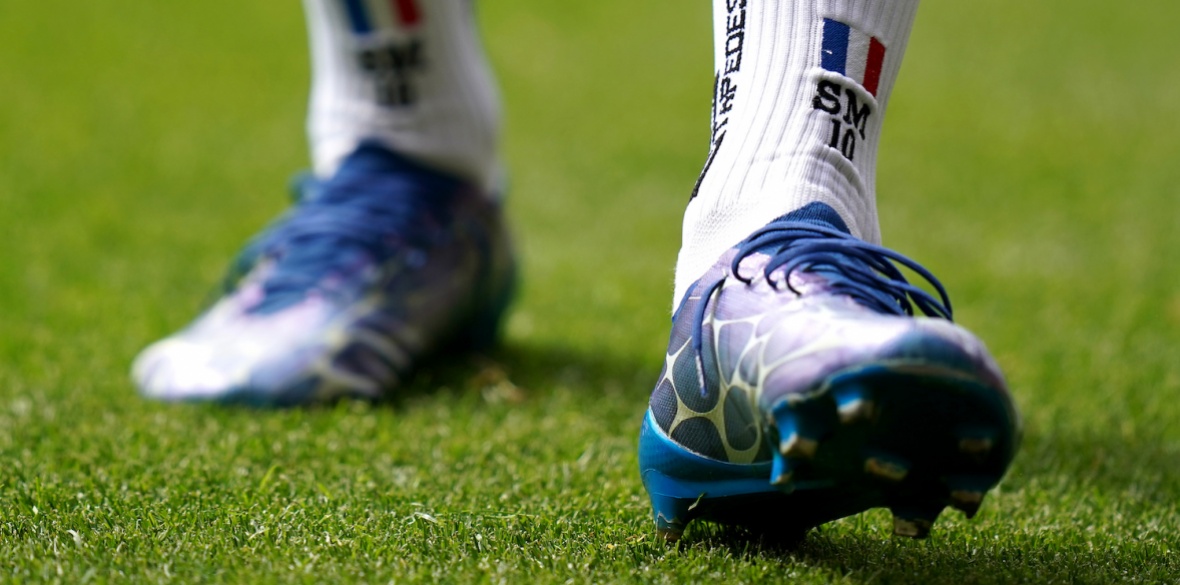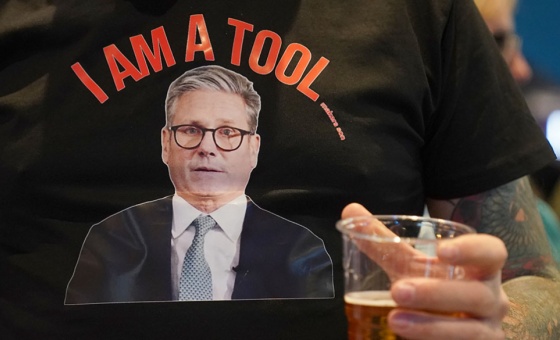This is the last article you can read this month
You can read more article this month
You can read more articles this month
Sorry your limit is up for this month
Reset on:
Please help support the Morning Star by subscribing here
FOR those of us that follow it, football holds a truly romantic quality. This beauty derives from the fact that the outcome is never predetermined; your club may kill a giant, or your nation — perhaps relatively small and unimportant in the wider world — might produce one of the greatest talents of its generation.
The possibilities of “what might be” dangle tantalisingly in front of us and make us yearn. The power of football stems from its ability to transcend the cold rationality which seems to govern so much of our lives.
On the football pitch, the underdog can win. On the football pitch, no country, no matter how large or small, has a monopoly on talent.
Yes, great players can, and have come from large footballing nations, but they have also come from Wales, Northern Ireland, Bulgaria, and Liberia.
When it comes to football, all the world’s a stage and each of us, whether fan, player, journalist, or referee have a part to play in this magical scene.
Some of this magic will never fade. Smaller teams will always upset a larger one, footballing talent will always sprout in unexpected places.
However, in moving away from the beautiful chaos of a singular game or singular talent, football is becoming more predetermined. How many teams are truly capable of winning the Champions League, or the Premiership, or La Liga?
The idea that Porto, Marseille, or PSV — let alone Crvena Zvezda (Red Star Belgrade) or Steaua Bucharest — could win the European Cup again almost veers into the realms of fantasy. Football, which for so many is a respite from the calculating, all-encompassing embrace of the capitalist system is itself being transformed in a way which echoes and mirrors that very system.
Far from being separate from the wider capitalist system, the inequalities that exist between places and between nations are being reproduced within the footballing system.
Moving briefly away from football, a novel way of understanding the role and function of different countries in the economic realm is to view each place as being interconnected within a world-system.
Within this system, each place has its own part to play (although this role may not always be beneficial to it).
African nations export primary resources, Asian countries export cheap consumer products, South American countries export foodstuffs. On the other hand, the US exports “culture” and finance while Europe exports higher-value products such as cars.
North America and Europe also suck in resources and people from peripheral areas in South America, Africa, and Asia. These processes of unequal exchange which lock countries into specific forms of development have been exported to the footballing world.
Importantly, just as we cannot understand the world economy by looking at countries in isolation, we cannot understand the position of different national leagues without understanding their relationship with other leagues.
Samir Amin argued that “capitalism is not the United States and Germany, with India and Ethiopia only ‘halfway’ capitalist. Capitalism is the United States and India, Germany, and Ethiopia, taken together.”
Global football is not the Premier League and Serie A, with the Uruguayan Primera Division and the Egyptian Premier League “halfway” global. Global football is all leagues taken together.
Within the footballing world-system each national league plays its own role and function, and these hold striking similarities to the wider capitalist system. Peripheral leagues exist for “resource” or player extraction, semiperipheral nations for “resource”/player development, and the core — or richest leagues — hoard those resources/players and exploit their value.
Perhaps unsurprisingly, these trends show congruence with the same neocolonial dynamics we see within the wider capitalist system.
The largest source of player extraction is South America. According to the CIES Football Observatory, Brazil has more expatriates playing in foreign leagues than any other country.
Over three times as many Brazilians play in the Primeira Division of its former imperial master than any other foreign league. Furthermore, the largest European destination for players from Argentina, Uruguay, and Mexico is Spain.
The biggest importer of talent from Francophone West Africa continues to be (you guessed it) France, with over double the number of players from Mali, Senegal, and Cameroon arriving there than the second-placed destination.
This clearly shows the continuing role of colonialism in “attracting” players from poorer leagues. This process, however, is not confined to the former colonies.
The larger European leagues also prey on the smaller and weaker leagues within Europe. Germany, for example, monopolises the importation of players from Poland, Austria, and Switzerland while Italy does the same with the countries of the Balkans.
This resource extraction becomes particularly pertinent when the number of foreign-born players as a percentage of a league’s total is considered.
The Brazilian and Argentinian leagues have very low levels of foreign-born players with 9.8 per cent in the former and 11.2 per cent in the latter.
In the “Big 5” European leagues, the number of expatriate players ranges from 63.6 per cent of the total in Serie A, to 39.7 per cent in Ligue 1. In effect, the “product” of the big European leagues is built upon the resources of poorer nations, a situation all too familiar for those that understand unequal value flows between countries.
Not only do player imports from poorer leagues improve the position of the European leagues, but it also hinders the ability of home countries and leagues to develop.
Within the global capitalist economy, the movement of teachers, nurses, doctors, and specialists from poorer countries to Europe and the US reduces the amount of people with those skills within the home country, even though it is the home country that has paid to develop those skills.
A similar process is emerging in those nations that export footballers, especially in Latin America. In these leagues, there exists a “missing middle” whereby a large percentage of players are either very young — and hoping to leave — or old and are returning after spending their prime years abroad.
The number of players under the age of 21 is much higher in the Brazilian and Argentinian leagues (9.4 and 9.3 per cent respectively) than in any major European league, such as the Premiership (4.2 per cent) or La Liga (4.6 per cent).
Even so, the average age of players in the Brazilian and Argentinian leagues is older than every major European league (yes, even the Italians).
This is because over 30 per cent of players in both leagues are over 30, compared with 21.5 per cent in the Bundesliga or 18.9 per cent in Ligue 1. These players are therefore developed in poorer leagues, enjoy their best years abroad, don’t benefit the national league which developed them, and return past their peaks.
Perhaps this system could be justified if the capital from player sales was used to enrich the leagues of origin, but again it is European clubs who benefit from these sales.
A comparison to the wider capitalist economy helps illuminate this point. Germany — as a processor of coffee — earns more from its sale than all coffee-producing African countries.
The system has been developed in such a way that it is not the resource itself, but the way that resource is processed that adds value.
In a footballing context, it is the European clubs that have “processed” players to their own economic benefit, rather than the nation that developed them.
Just this year Casemiro has been sold for £60 million, he was bought from the Brazilian league for roughly £3.5m. Antony was bought from Sao Paulo for £13m and has now been sold for £82m. Darwin Nunez came to Europe for a fee under £4m and has now been sold for £62m.
This system of exploitation can exist because there is a core of European teams which can pay highly inflated transfer fees and wages with which no other team can compete.
Barcelona is correct, it is Mes Que Un Club but not in the original meaning of that statement. They are not a club; they are a behemoth which can extract resources from global and national sources.
Nowhere exemplifies the inequality inherent within the footballing world-system better than the Premier League. According to Forbes, 11 of the 20 most valuable football teams in Europe are in the Premiership.
Clearly, this is not solely due to sporting “history” or “prowess.” Everton, Leicester, West Ham, Leeds, and Aston Villa are all in the rich list, and with all due respect, it would not be difficult to find five European teams that are either historically or currently more successful.
The Premier League has become a resource magnet that can suck in talent as it pleases, rendering “sensible” economic planning obsolete. If we compare Forbes’s evaluations of the most valuable football teams in the Americas, this situation becomes more apparent.
Corinthians — the most valuable team in Brazil — is worth just over half of Everton. River Plate — Argentina’s most valuable club — could be bought three times over with the value of Aston Villa.
Rather than being a game of organised chaos where teams can defy the odds, where there is healthy competition, and where talent is dispersed throughout the leagues, football is emulating the wider capitalist system which is both highly organised and highly unequal.
Each national league plays an important function within this system; poorer leagues exist as cash cows to be sucked dry.
The smaller and middle-sized European leagues act as intermediaries between these smaller leagues and the larger leagues, making their money from the value of others.
At the heart of this system — led and exemplified by the Premier League — exists a core of clubs that export “culture” or “brand” and a product which has its roots elsewhere.
Yes, the European Super League — which would have solidified this process indefinitely — has been defeated for now. But the system that this league embodied has already been built.
For those of us that watch the Premier League, we may feel like King Midas, and everything has turned to gold, but like Midas we may soon find that this is really a curse, taking away what we truly love about football: its soul.











